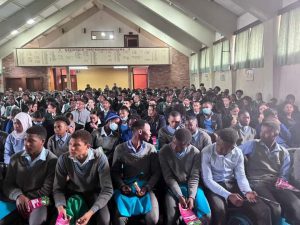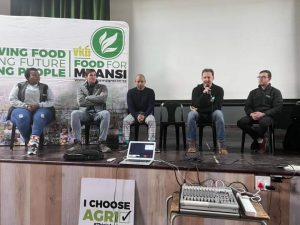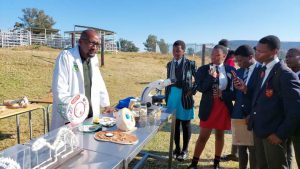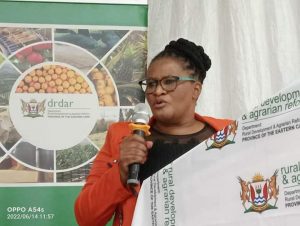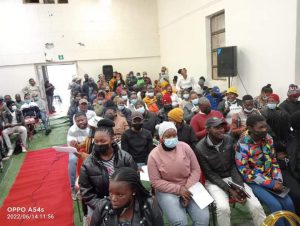
by Olwetu Batyi | Aug 12, 2022 | Uncategorized

MEC for DRDAR Nonkqubela Pieters with Agri-EC President Peter Cloete (right) and his deputy Eben du Plessis during the congress of the Agri-EC.
“I urge the farming community to be very sensitive when hiring people for jobs and prioritise local people in the communities where they operate,” Premier Lubabalo Oscar Mabuyane.


by Olwetu Batyi | Aug 11, 2022 | Uncategorized

About 800 learners from the Nelson Mandela Metro Municipality attended the roadshow organized by Food for Mzansi news site in Kariega (previously Uitenhage) at the Hoërskool Brandwag.
DRDAR was represented by the Communication and Customer Care Services and their exhibition stall was frequently visited by pupils seeking information.

As we celebrate Women’s Month it was interesting to see more female learners making enquiries at the stall wanting to get information on how they can venture into the male dominated sector.


by Olwetu Batyi | Jul 21, 2022 | Uncategorized

DRDAR provided seedlings to 20 households and Langalitshoni JSS at Emaplotini Village, chicken Feed and bags of fertiliser to a local cooperative. As part of the build up to the main event, the Department’s Veterinary Services vaccinated cats and dogs for rabies, conducted sheep scab and blanthrax vaccinations.
Locals were also educated about plant and animal sciences.

by Olwetu Batyi | Jul 21, 2022 | Uncategorized

The Department of Rural Development and Agrarian Reform’s Human and Institutional Capacitation Chief Directorate hosted learners from various schools across the province, as part of creating awareness about the Agricultural sector.
Learners were exposed to the Agricultural sector and the entire value chain including animal health/production, home industry such as baking and yoghurt production, animal anatomy and veterinary services.
Daniel Matlou a microbiologist at TARDI shows some of the learners different animal organs, skeletons and parasites.

by Olwetu Batyi | Jul 21, 2022 | Uncategorized

MEC PIETERS TELLS YOUTH TO IDENTIFY GAPS IN EXISTING MARKETS
WITH many Agricultural markets said to be saturated already and some hogged by established institutions, MEC for Rural Development and Agrarian has challenged the youth of the province to think smart and identify gaps on the existing markets.
Pieters was speaking at a Youth Entrepreneurship Workshop held in Port St Johns on Tuesday [June 14] this week where she said the competition was already too high for beginners in many markets but the youth had their special space with their innovative ideas.
The workshop is part of this year’s commemoration of Youth Day under the theme: “Growing South Africa together in the period of Covid 19.”
Currently, the Eastern Cape is listed among the top producers of citrus in the country but the mesh citrus sacks in which they are packed and sold are sourced from the Kwa-Zulu Natal Province.
“The local production of mesh citrus sacks is just one of many gaps that young people of today need to exploit. Efforts are made at parliament level to implement and amend policies where necessary to create a conducive ground for economic freedom and inclusive economy. Your peers are already producing vegetables, fruit, grain and livestock. Find a way in which you can complement them,” said Pieters.
The Eastern Cape Department of Rural Development and Agrarian Reform has just partnered with the United Nations World Food Program to upscale its small-scale farmers. This will allow them to produce and sell food to the UN World Food programme for its humanitarian interventions while also selling to local markets.
Currently agriculture contributes 1.8% to the province’s GDP and accounts for 7.3% employment, which is also 11% of the national employment in the agricultural sector. This contribution forms a key factor in the province’s rural development agenda.

“We have all seen the devastation caused by Covid-19 in the world’s economies. The fight between Ukraine and Russia has worsened the situation further, but in the process of rebuilding our economy lies opportunities that need fresh legs and young minds. Our partnership with UN World Food programme is one of those that young people need to identify unconventional gaps and benefit from them because already the government has established institutions that are dedicated to your development,” said Pieters.
Among those is the National Youth Development Agency (NYDA) and the W&RSETA that explained their services aimed at youth development.
Speaking to DRDAR Communication after the workshop Mziwamacirhsa Dlambulo a poultry farmer from Mbhashe Local Municipality said: “In this workshop I learnt about different agencies where I can be assisted regarding to poultry farming funding. I am grateful to the department for hosting this workshop”.




